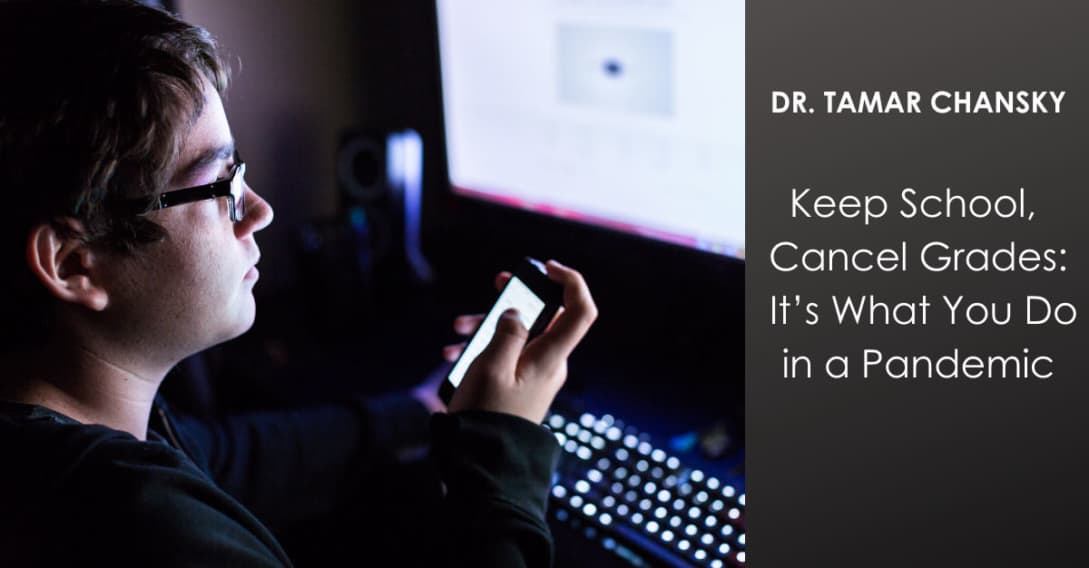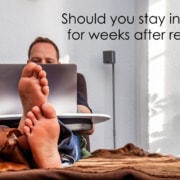An Anxiety Therapist’s Appeal in a Pandemic
Tamar Chansky, PhD

Dr. Tamar Chansky is the founder and director of the Children’s and Adult Center for OCD and Anxiety, and author of Freeing Your Child from Anxiety, and Freeing Your Child from Obsessive-Compulsive Disorder. She is frequently featured on television, radio, and in print media. Her latest article addresses the impact of COVID-19 isolation and disruption to our normal lives: “Keep School, Cancel Grades: It’s What You Do in a Pandemic: An Anxiety Therapist’s Appeal”
I can’t learn like this. How can I worry about the test we have Friday when the world is imploding—how do I stop thinking about that? Should I?
How do I meet for my group project when my mom needs to use the computer at night?
Nothing’s normal now—why are we pretending that school is normal?
My child is on virtual school all day and then homework at night, weren’t we trying to get kids off of screens?
As reports of COVID-19 started to surface in the media in February, I spoke with Business Insider about what parents should be saying to kids about the virus. My answer back when life still made sense: Parents should tell kids to wash their hands as always, and everything else would be “business as usual until further notice.”
Well, further notice is here and business as usual—as we are sheltering at home, stores closed, trying to figure out groceries, distance work, and how to make face masks out of old t-shirt sleeves that we aren’t already using in place of paper towels—is not only not usual, but in many cases non-existent.
COVID-19 has shaken us and our sense of safety and security to the core, shrunk our lives down to the size of our rooms, and at the same time proven the interconnectedness of our collective existence with each fraught vector of our being.
Then there are the kids. . .
While the pandemic rages, kids—whom we were already worried about pre-pandemic as nearly half suffer from a psychiatric disorder, the majority with anxiety—are trying their best to do online classes all day, thanks to the resourceful, heroic efforts of their teachers who built online instruction essentially overnight. On some level this is reassuring. Even in times of extreme uncertainty and disruption, there is structure: School goes on.
But the reality of distance learning—adjusting to those suddenly small screens (for kids lucky enough to have a screen to call their own) and zooming into class while the world spins out of control around them hits hard. Our children are beyond stressed just trying to learn how to work Zoom or Google classroom.
On top of that, they are worrying about their assignments, tests, and grades, just as they always did, but now from an emotionally shaky starting point where everything is turned upside down. They are scared, having nightmares, trying to process what this means for them—when will they see their friends again, what will their summer look like? What happens for college acceptance visits? And for college students—when will they ever go back?—their belongings and the life they knew quarantined back at school.
Meanwhile, more and more students are feeling the direct impact of COVID-19, learning of friends, coaches, and family members who have the virus. How can they focus on math facts or chemistry when their mind is racing ahead with fear about that?
Parents, struggling to keep up with their own adjustments, worrying about groceries, jobs, health, the future, understandably struggle to be reassuring about the state of the world in general, plus: They don’t know how online school works. And what if a child gets a B- in a pandemic? Who would console them? As we move into this time of COVID-19’s impact being felt through unprecedented filing for bankruptcy and unemployment, stressful quarantines, and grieving those who succumb to the virus: No one has time for that.
As a therapist long witnessing the sharp rise in anxiety in children and teens over the years, I am deeply concerned about the lasting impact this crisis will have on our students’ mental health and well-being. It’s time to step out of the normal, look at the big picture and what’s at stake, and take the pressure off our kids by cancelling grades in this pandemic semester. Make the semester Mandatory Credit/No Credit. Harvard Law School did this days ago. The Chronicle of Higher Education recommended it, too. The sooner the better. Do it now and let children’s nervous systems do a much needed re-set.
What benefit will be gained in the weeks to come by rigidly sticking to curricula and grade expectations crafted in less-apocalyptic times? Or really what is the cost? We mustn’t tend to one crisis by inadvertently stoking another.
Please read more about this vital issue on Dr. Chansky’s website: TamarChansky.com and help spread her message.








